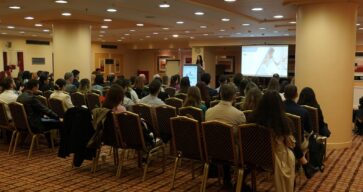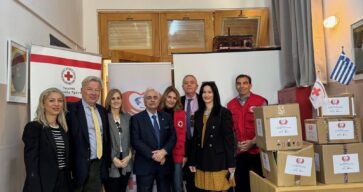European Immunization Week: 23–29 April 2018 Greece spends a minimal amount on prevention, OECD finds
Press Release
European Immunization Week: 23–29 April 2018
Greece spends a minimal amount on prevention, OECD finds
Athens, 23 April 2018 – The Hellenic Association of Pharmaceutical Companies (SFEE) takes this opportunity during European Immunization Week (23-29 April) to remind people that immunizations must be a priority in safeguarding public health. Greece spends only 1.3% of its total public healthcare budget on prevention, making it second-to-last among 34 countries of the Organisation for Economic Co-operation and Development (OECD). Specifically, expenditures for immunizations are the lowest among the OECD 34 member countries, and amount to almost €5 per resident. It should be noted that factors such as failure to comply with the recommendations of the national immunization programme and inflows of refugees increase the probability of epidemic or pandemic outbreaks, with serious implications for the health of the population. A recent example is the outbreak of measles in Europe and Greece. In Greece, there have already been 2,500 recorded cases of measles in less than a year, and three of these were fatal, according to Hellenic Centre for Disease Control and Prevention (HCDCP) epidemiological data.
European Immunization Week is an initiative coordinated by the World Health Organization (WHO) and observed by member countries. This week, all countries have adopted the slogan “Prevent. Protect. Immunize”, and are organising activities chiefly aimed at raising awareness of the benefits of immunization among the population, healthcare authorities and the medical community.
Immunization is one of the 10 most important achievements of the 20th century for the protection and defence of public health. Thanks to the discovery of vaccines and the broad application of immunization programmes, a number of deadly infectious diseases (diphtheria, poliomyelitis) have been eliminated, significantly reducing the burden of communicable disease and freeing up resources for healthcare systems. The WHO estimates that each year, 2-3 million deaths worldwide are averted by immunization, while 750,000 children are saved from disabilities. It is estimated that 1.5 million deaths could be averted globally with increased vaccination coverage, while mass vaccination can offer numerous benefits to patients suffering from chronic diseases.
Seeing the benefits of immunization for public health, the WHO General Assembly developed a Global Vaccine Action Plan, as part of the Decade of Vaccines, aimed at achieving 90% vaccine coverage for all vaccinations included in national immunization programmes all over the world by 2020.
In recognising the importance of prevention and timely diagnosis, SFEE has made immunization a priority and sees as key to maintaining citizens’ good health. All organisations should work together in this common endeavour to provide citizens with accurate information on vaccines. This will fortify both Greece and the European continent overall against communicable diseases. The broad implementation of immunization programmes reduces the direct cost involved in medical treatment of vaccine-preventable diseases and their complications, and the indirect cost of hospitalisation and loss of work hours.
SFEE’s corporate members have always been concerned with meeting Greece’s needs and are doing their best to ensure adequate supplies of vaccines on the market. Exempting vaccines from fiscal measures and including immunization expenditures in funds for prevention will provide needed monies for targeted actions to stimulate vaccine coverage (such as ongoing public information about the value of immunization), monitoring and record-keeping. The actions can be realised with the support of all the organisations involved.
SFEE President Olympios Papadimitriou said: “Vaccines are not a treatment; they prevent the need for treatment. They should, therefore, be included in another, separate budget – the one intended for prevention and not for pharmaceuticals. One such budget would include campaigns to inform the public, the implementation of a comprehensive immunization programme together with the cost of the vaccines, which is estimated at €110 million6 in Greece, and the documentation of vaccine coverage. Now is the right time.”
-End-
OECD Health Working Papers No. 101, How much do OECD countries spend on prevention?
Centers for Disease Control and Prevention. Ten great public health achievements-United States, 1900-1999. MMWR. 1999; 48(12): 241-243
HCDCP, European Immunization Week. Immunization in Europe and Greece.
http://www.keelpno.gr/elgr/e%CF%85%CF%81%CF%89%CF%80%CE%B5%CE%B2%CE%B4%CE%BF%CE%BC%CE%AC%CE%B4%CE%B1%CE%B5%CE%BC%CE%B2%CE%BF%CE%BB%CE%B9%CE%B1%CF%83%CE%BC%CE%BF%CF%8D.aspx. Accessed 20-4-2017
WHO. http://apps.who.int/iris/bitstream/10665/63043/1/WHO_GPV_ PR_96.01.pdf, Accessed 11/8/17
The cost of immunization falls under the National Healthcare Service Provider (EOPYY) budget for out-of-hospital public pharmaceutical care. In recent years, the budget has been restricted to €1.945 billion, with pharmaceutical companies being asked to refund overruns through the clawback mechanism, since total expenditures for pharmaceutical care were far greater.
The vaccine market in Greece is estimated at €110 million, 80% of which involves vaccines for children and adolescents, and 20% for adults.



